Google’s New AI-Powered Browser Could Mark the End of the Human Internet
 Starting next month, Google will begin rolling on a new experimental feature in Chrome, the most popular browser on Earth, and the portal through which an estimated 3 billion people read and contribute to the web: an AI writing assistant. “Writing on the web can be daunting, especially if you want to articulate your thoughts on public spaces or forums,” the company says. Chrome’s new tool will help users “write with more confidence,” whether they want to “leave a well-written review for a restaurant, craft a friendly RSVP for a party, or make a formal inquiry about an apartment rental.”
Starting next month, Google will begin rolling on a new experimental feature in Chrome, the most popular browser on Earth, and the portal through which an estimated 3 billion people read and contribute to the web: an AI writing assistant. “Writing on the web can be daunting, especially if you want to articulate your thoughts on public spaces or forums,” the company says. Chrome’s new tool will help users “write with more confidence,” whether they want to “leave a well-written review for a restaurant, craft a friendly RSVP for a party, or make a formal inquiry about an apartment rental.”
AI assistants have been popping up in popular software about as fast as developers can code them. Google has been testing generative AI in Gmail, Android messaging, and Docs for months; Microsoft has added similar features to Office, its Edge browser, and Windows itself. This was, in other words, basically inevitable: as new features in an interface, “help me write” buttons and features are a natural extension of suggested replies and even spellcheck; Google has the technology to build this, and reason to believe at least some Chrome users will be excited to use it. Millions of people already use software like ChatGPT and Anthropic to generate text that they then deploy in basically every imaginable context. Google building something similar into Chrome was only a matter of time — as soon as it could, it would. At launch, this will be a right-click feature in limited testing. If it ends up anything like the generative AI tools Google has been building into Docs, it’ll be as easy to ignore as it is to use.
At launch, this will be a right-click feature in limited testing. If it ends up anything like the generative AI tools Google has been building into Docs, it’ll be as easy to ignore as it is to use.
As generative AI rollouts go, though, this is a big one. For the first time, potentially billions of people will be confronted with the option to have software write on their behalf, in virtually every online context: not just emails or documents, but social-media sites, comment sections, forums, product reviews, feedback forums, job applications, and chat platforms. Instead of, or in addition to, people posting something themselves, Google will offer users statistically likely responses, as well as options for making them shorter or longer or adjusting their tone. The web as we know it is, basically, the result of billions of people typing into billions of browser text boxes with the intention of reaching other people, or at least another person. The experiences of searching, reading, shopping, and wandering on the web have depended on varying extents on the presence of text and media that other users have contributed, often for free and under the auspices of participation in human-centered systems — that is, as themselves, or some version of themselves, with other people in mind. What happens when the text boxes can fill themselves?
Features like this will be, among other things, a massive test of how people actually want to use generative AI. Text generation is already popular in situations where people have to perform highly artificial tones and styles — from the jump, ChatGPT users have found it appealing for writing résumés and cover letters, for example (although it’s unclear, for a variety of reasons, whether this is a good idea). Does a “help me write” button make sense to anyone in the context of a Reddit thread, a fired-up comment section, a jokey response to a friend’s post, a Goodreads review, or an Amazon product page? These are contexts where evidence of humanity is valuable, and where the averaged-out tones of generated text might read as competent spam.
Optimistically, based on having access to a few similar tools for the last six months, my guess is that, in many and maybe most cases, they’ll feel absurd or inappropriate to use — like productivity hacks jammed into what are basically social situations, bug-eyed Clippys hovering awkwardly next to comment threads, tools presenting themselves in contexts where their use would be strange and borderline offensive.
Follow @Emancipat6 for more

































